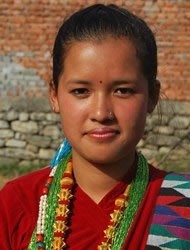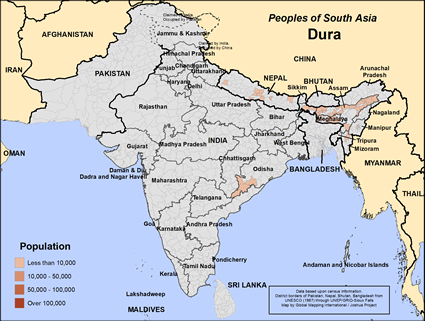Dura in India

Photo Source:
Jai Dura
|

Map Source:
People Group data: Omid. Map geography: UNESCO / GMI. Map Design: Joshua Project.
|
| People Name: | Dura |
| Country: | India |
| 10/40 Window: | Yes |
| Population: | 3,200 |
| World Population: | 8,700 |
| Primary Language: | Odia |
| Primary Religion: | Hinduism |
| Christian Adherents: | 1.27 % |
| Evangelicals: | 0.00 % |
| Scripture: | Complete Bible |
| Ministry Resources: | Yes |
| Jesus Film: | Yes |
| Audio Recordings: | Yes |
| People Cluster: | South Asia Hindu - other |
| Affinity Bloc: | South Asian Peoples |
| Progress Level: |
|
Introduction / History
The Dura are believed to have originated in Dullu Dailekh to the west. They migrated to their present location at various stages between the 8th and 12th centuries AD. At the time they had a far larger population than they do today. The Dura were originally a group with their own Tibeto-Burman language. Over the course of the centuries the Dura area has been inundated with Hindus from the south. Gradually they lost the use of their mother tongue. Today they speak Nepali in Nepal and Odiya in India's state of Odisha.
Their sons are fitted with bows and arrows on the very day of their naming ceremonies.
What Are Their Lives Like?
There have been concerted efforts to record as much of the Dura language as possible, including a list of more than 200 words, but these seem destined for historical use only. Despite the loss of their language, the Dura remain a proud and unique people.
What Are Their Beliefs?
Another part of their identity that is presently undergoing a process of assimilation are their religious beliefs. For centuries, Buddhism played the dominant role in Dura spiritual life. They lived at the southern end of the Tibetan Buddhist world, but after centuries of pressure from Hindu migrants, many of the Dura's Buddhist practices have now been subsumed into a complicated Hindu-Buddhist mix. The Dura worship many Hindu deities alongside images of Buddha.
The Dura still have lamas who serve the community's Buddhist needs, and most of their birth and funeral rituals are Buddhist in nature. When someone dies, they summon a lama to perform the last rites. It is noteworthy that the Dura go back to their Buddhist roots at times of death. On other important occasions, however, they perform Hindu rituals, especially matrimonial rituals.
What Are Their Needs?
For more than a thousand years the Dura have been waiting to hear the gospel. In recent years a very small number have believed in Christ, but most of this fascinating group have yet to hear the good news. These people still need to put their hope and identity in the King of kings and Lord of lords.
Prayer Points
Pray for workers to go to the Dura people, and for their hearts to be ready to receive their Savior.
Pray for families of believers loving and serving others to grow reproducing churches.
Pray for a chain reaction of families reaching families that results in thousands of new believers who share their faith with others.
Pray for grace and truth expanding into their entire society as all believers learn to love others.